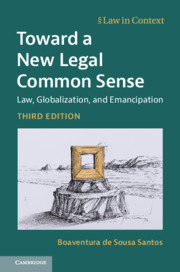Book contents
- Toward a New Legal Common Sense
- The Law in Context Series
- Toward a New Legal Common Sense
- Copyright page
- Dedication
- Contents
- Preface to the Third Edition
- Preface to the Second Edition
- Acknowledgements
- 1 The Tension between Regulation and Emancipation in Western Modernity and Its Demise
- 2 Toward an Oppositional Postmodern Understanding of Law
- 3 Legal Plurality and the Time-Spaces of Law: The Local, the National, and the Global
- 4 The Law of the Oppressed: The Construction and Reproduction of Legality in Pasargada
- 5 Globalization, Nation-States, and the Legal Field: From Legal Diaspora to Legal Ecumenism?
- 6 Law and Democracy: The Global Reform of Courts
- 7 On Modes of Production of Social Law and Social Power
- 8 Law: A Map of Misreading
- 9 Can Law Be Emancipatory?
- Postface as Disquietude
- Bibliography
- Index of Names
- Index of Subjects
Postface as Disquietude
Published online by Cambridge University Press: 08 October 2020
- Toward a New Legal Common Sense
- The Law in Context Series
- Toward a New Legal Common Sense
- Copyright page
- Dedication
- Contents
- Preface to the Third Edition
- Preface to the Second Edition
- Acknowledgements
- 1 The Tension between Regulation and Emancipation in Western Modernity and Its Demise
- 2 Toward an Oppositional Postmodern Understanding of Law
- 3 Legal Plurality and the Time-Spaces of Law: The Local, the National, and the Global
- 4 The Law of the Oppressed: The Construction and Reproduction of Legality in Pasargada
- 5 Globalization, Nation-States, and the Legal Field: From Legal Diaspora to Legal Ecumenism?
- 6 Law and Democracy: The Global Reform of Courts
- 7 On Modes of Production of Social Law and Social Power
- 8 Law: A Map of Misreading
- 9 Can Law Be Emancipatory?
- Postface as Disquietude
- Bibliography
- Index of Names
- Index of Subjects
Summary
Until the mid-2000s, my socio-legal theory of law was grounded on the basic tension between social regulation and social emancipation. This creative tension gave rise, in due course, to new forms of social regulation which met with resistance by new forms of social emancipation. This tension was played out in several fields and scales of social and political action. It accounted for the contradictory nature of the nation-state torn apart by the contradictory demands of the three principles of modern regulation: the principle of the state, the principle of the market, and the principle of the community. Such contradictions had many faces: the coexistence of the state monopoly of the legal system with instances of legal pluralism at the local level; the impact on the nation state and its legal system of confrontation between hegemonic globalization, led by capitalism imperatives, and counter-hegemonic globalizations, led by social movements that resisted against such imperatives; the inherently ambiguous role of courts vis-à-vis democracy, now strengthening it and now weakening it. Particularly in Chapters 7 and 8, I tried to account for such contradictions and tension in a larger societal terrain. I ended the book with a chapter titled “Can Law Be Emancipatory?” My main concern in this chapter was to evaluate the impact of the increasing disfiguring of the tension between social regulation and social emancipation as the aspiration of an emancipatory alternative was increasingly surrendering to the imperatives of existing social regulation. As I then formulated this process, social emancipation was collapsing into social regulation. In my view, this was the result of two decades of aggressive neoliberal ideology claiming that there was no alternative to capitalism and not even to the current liberal capitalism increasingly dominated by financial capital, the most anti-social fraction of capital. I analyzed the demise of the social contract and denounced the ever-growing masses of the world population left without any realistic recourse to legal redress for wrongs committed against them. To account for that theoretically, I offered a complex characterization of the liberal, apparently monolithic, concept of civil society. I distinguished three types of civil society: the intimate, the strange, and the uncivil civil society. The latter corresponded to the people that were thrown out of the social contract or were unable of entering it. The concept of social fascism was offered to account for the populations located in or thrown into the uncivil civil society. Social fascism was defined as the condition of those whose life chances depend on the veto of the non-democratically controlled power of other more powerful social groups or classes. And I concluded that we are living in societies that are, at best, politically democratic but socially fascistic. Under the concept of subaltern cosmopolitan legality, I offered a series of alternative legal initiatives that might keep alive the social emancipatory possibilities of law. Such initiatives called for an intercultural understanding of law; some of them were to be carried out outside the state, as a kind of extra-institutional insurgency, while others would operate through the state as the latter underwent democratic reforms. In this regard, and having in mind the new social movements, I contemplated the possibility of the state becoming the newest social movement.
- Type
- Chapter
- Information
- Toward a New Legal Common SenseLaw, Globalization, and Emancipation, pp. 587 - 597Publisher: Cambridge University PressPrint publication year: 2020

